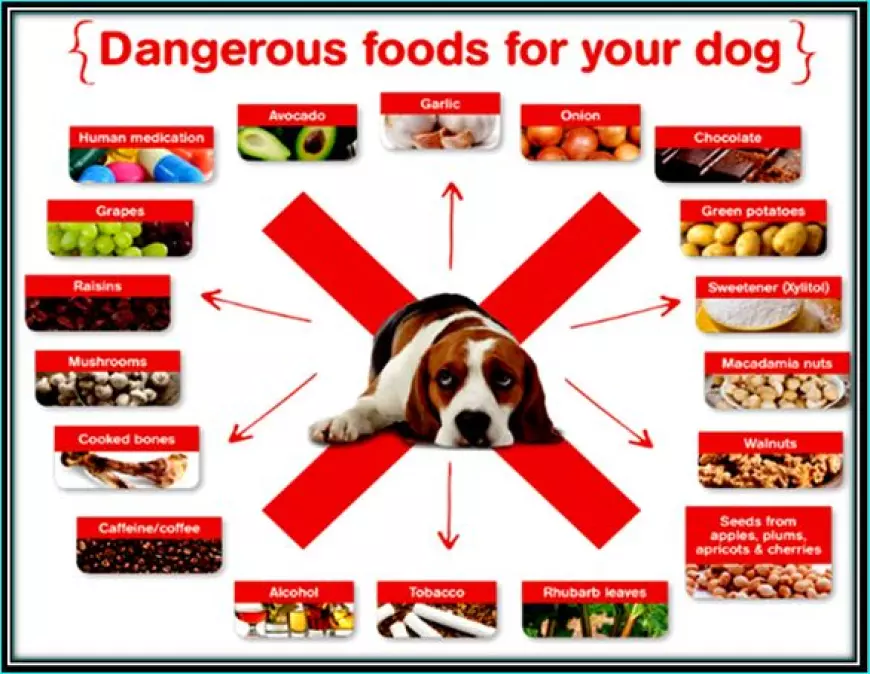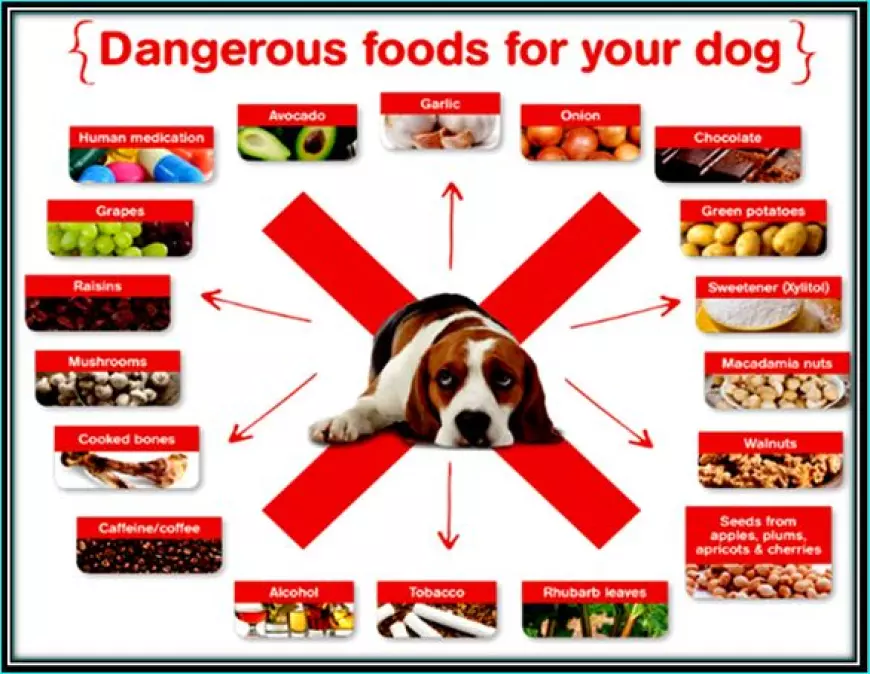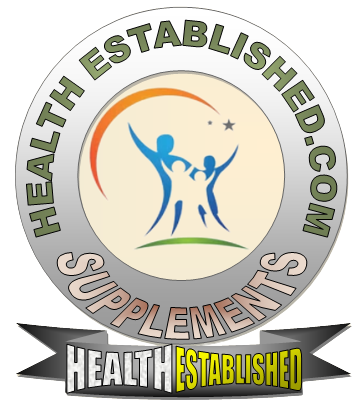What Foods Are Toxic to Dogs? A Guide to Keeping Your Pup Safe
Don't risk your dog's health - find out what foods are toxic to them in our comprehensive guide. Safeguard their well-being today.

The Dangers of Toxic Foods for Dogs
Many pet owners may not realize just how dangerous some common foods can be for dogs. While certain human foods are safe and even beneficial for our canine companions, others can cause severe toxicity and potentially be life-threatening. One such example is chocolate, a treat most of us indulge in without a second thought. However, chocolate contains theobromine and caffeine, both of which can adversely affect dogs' nervous systems and cardiovascular health. Even small amounts of chocolate can lead to symptoms like vomiting, diarrhea, increased heart rate, seizures, and in extreme cases, death.
Another seemingly innocent food that poses a significant threat to dogs' well-being is grapes or raisins. These fruits contain an unknown toxin that can cause kidney failure in dogs when ingested. The exact substance responsible for this toxicity is still under investigation; however, it is clear that consuming even a small quantity of grapes or raisins can have serious consequences for our four-legged friends. Symptoms to watch out for include vomiting, diarrhea, abdominal pain, lethargy, loss of appetite, dehydration, and decreased urine production.
It's essential to understand the potential dangers hiding within common foods we humans enjoy so freely but could pose significant risks to our beloved pets. Being aware of these toxic substances empowers us as responsible pet owners to make informed decisions about what we feed our furry friends – helping keep them healthy and safe for years to come.
Common Foods That Are Toxic to Dogs
When it comes to sharing food with our furry friends, it's crucial to know which common foods can actually be toxic to dogs. While some may think that a small treat or two won't harm their canine companion, certain everyday items found in our kitchens can pose a serious risk. One such item is chocolate. Although many of us relish the rich and indulgent taste of chocolate, for dogs, it can be deadly. The presence of theobromine and caffeine in chocolate can affect a dog's central nervous system and heart, leading to symptoms like increased heart rate, tremors, seizures, and even death.
Another surprising culprit are grapes or raisins. Despite being considered healthy snacks for humans, these fruits are highly toxic to dogs and can cause kidney failure if ingested. Even small quantities have been known to elicit serious health issues in canines. Furthermore, onions and garlic should also be avoided when cooking meals for your four-legged friend as they contain compounds that damage red blood cells and may lead to anemia.
It's important for pet owners to be aware of these potential dangers lurking around the corner - not just for the health and well-being of their beloved pets but also for peace of mind. Sharing our lives with dogs means being responsible stewards who prioritize their safety above all else. So next time you're preparing a delicious meal or indulging in your favorite snack at home, remember: what might be tasty for you could spell disaster for your furry companion if accidentally consumed!
Chocolate and Caffeine
While many of us can't resist indulging in a piece of chocolate or sipping on a cup of coffee to get through our day, it's important to remember that these common treats pose significant dangers for our furry friends. Chocolate contains theobromine, a substance found naturally in cocoa beans. While humans metabolize theobromine relatively quickly without experiencing any adverse effects, dogs process it much more slowly. This means that even small amounts of chocolate can be toxic to your pup and potentially lead to symptoms ranging from vomiting and diarrhea to tremors and seizures.
Similarly, caffeine is also found in chocolate as well as coffee and certain energy drinks. Just like with chocolate, dogs are unable to efficiently break down caffeine due to their differences in metabolism. Even tiny doses can wreak havoc on their system, causing restlessness, increased heart rate, muscle tremors, and even life-threatening complications like cardiac arrhythmias. It's vital for dog owners to keep all sources of caffeine securely out of reach from their pets.
To ensure the safety and well-being of your beloved pet, it's crucial to maintain awareness about the potential dangers associated with substances like chocolate and caffeine. Being mindful about what foods are toxic for your four-legged friend will not only prevent accidents but also promote a healthier lifestyle overall for both you and your faithful companion. Remember: when it comes to sharing food with your pup, some things are best left off the menu!

Grapes and Raisins
Grapes and raisins may seem like harmless and healthy treats for humans, but they can be extremely toxic to our furry friends. While the exact reason behind their toxicity is still unclear, it's important to remember that even a small amount of grapes or raisins can lead to serious health issues in dogs. These fruits contain substances that can cause kidney failure, leading to symptoms such as vomiting, diarrhea, abdominal pain, and increased thirst.
It's worth noting that not all dogs will have a reaction to grapes or raisins. Some may be more sensitive than others and even small quantities of these fruits can pose a significant threat. So it's best to err on the side of caution and avoid giving your pup any grapes or raisins altogether. If you suspect your dog has ingested them by accident or if you notice any of the aforementioned symptoms after consumption, it's crucial to seek immediate veterinary help as prompt treatment can greatly improve their chances of recovery.
To ensure your pet's safety at all times, make sure grape products are kept out of reach from curious noses in your household. Sharing food is an act filled with love for our pets – but when it comes to grapes and raisins, it truly is better safe than sorry!
Onions and Garlic
Onions and garlic might be staple ingredients in many savory dishes, but these aromatic vegetables can pose serious health risks to our furry friends. While they may add flavor and depth to our meals, onions and garlic contain compounds that are toxic to dogs. These compounds, known as thiosulphates, can cause a condition called hemolytic anemia in dogs, leading to the destruction of red blood cells.
One interesting thing to note is that the severity of the toxic effects depends on the amount consumed relative to the dog's body weight. This means that even a small amount of onion or garlic could potentially be harmful – so it's important to keep them away from your pup entirely. Additionally, it's worth mentioning that all forms of onions and garlic can be dangerous, including powdered, cooked, dehydrated, or in any other form commonly used for cooking.
If you're wondering why humans can safely consume onions and garlic while our canine companions cannot, it comes down to differences in metabolism. Dogs lack certain enzymes needed to break down the toxic components found in these vegetables. As a result, even small amounts can have severe consequences for their health.
To ensure your dog's safety and well-being, it's crucial to avoid feeding them any foods containing onions or garlic – whether as main ingredients or hidden additives. When preparing meals at home or choosing commercial pet food options, always read labels carefully and consult with your veterinarian if you're unsure about specific ingredients.
Xylitol and Artificial Sweeteners
While we often associate artificial sweeteners with humans, it is crucial to be aware of their potential dangers for our furry friends as well. Xylitol, a sugar substitute commonly found in sugar-free gum, candy, and baked goods, is especially toxic to dogs. It can cause a sudden drop in blood sugar levels and lead to symptoms such as vomiting, loss of coordination, seizures, and even liver failure. What makes xylitol particularly dangerous is that it only takes a small amount to have a significant impact on a dog's health.
Artificial sweeteners are increasingly prevalent in our food supply and can be found in products ranging from diet sodas to protein bars. Although these low-calorie alternatives may seem harmless or even beneficial for weight-conscious individuals, they pose serious risks for our canine companions. Dogs lack the necessary enzymes to metabolize certain artificial sweeteners correctly, making them highly toxic when ingested. It's worth noting that xylitol is not the only artificial sweetener that can harm dogs - others such as erythritol and stevia are also potentially hazardous.
To protect your pup from accidental xylitol poisoning or other artificial sweetener-related complications, it's essential to be diligent about reading labels and keeping any potentially harmful substances out of reach.
Conclusion: Keeping Your Dog Safe from Toxic Foods
In conclusion, it is crucial as responsible dog owners that we are vigilant when it comes to keeping our furry friends safe from toxic foods. While some foods are obvious dangers, such as chocolate and onions, there are many lesser-known items that can also be harmful to dogs. By being knowledgeable about these potential dangers and taking proactive measures to prevent access, we can ensure our beloved pets stay healthy and happy.
One often overlooked aspect of safeguarding against toxic foods is proper storage and disposal. It's not enough to simply be aware of which foods are dangerous; we must also take steps to keep them out of reach. This includes securely storing food items in a pantry or cupboard, using sealed containers for leftovers, and properly disposing of any potentially hazardous items. Remember, dogs have an uncanny ability to sniff out food even when it seems well hidden – so always err on the side of caution by choosing secure storage solutions.
Additionally, it's important to communicate with others who may interact with your dog regularly, such as family members or pet sitters. Educate them on the specific foods that should be avoided and ensure they understand the risks associated with feeding your pup anything outside their designated diet. By creating a unified effort within your household or circle of caregivers, you can significantly reduce the chances of accidental ingestion and keep your dog safe from toxic foods at all times.







